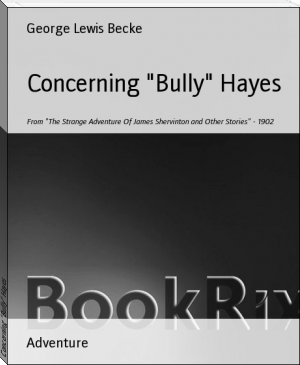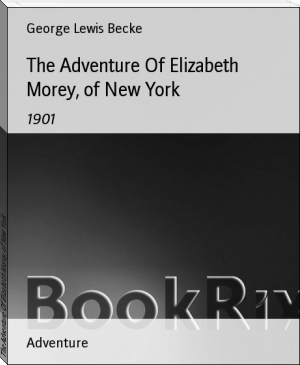Ridan The Devil And Other Stories - George Lewis Becke (free ebooks for android txt) 📗

- Author: George Lewis Becke
Book online «Ridan The Devil And Other Stories - George Lewis Becke (free ebooks for android txt) 📗». Author George Lewis Becke
So he sent a 'collect' telegram to his brother, and stated that he thoroughly understood all branches of poultry and book-keeping.
On the voyage up to Cooktown he kept to himself, and studied 'Pip and Its Remedy,' 'Warts and the Sulphur Cure,' 'Milligan on Roup in Ducks,' and other valuable works; so that when the steamer reached the port and he met his brother, the latter was deeply impressed with the profound knowledge he displayed of the various kinds of poultry diseases, and said he felt sure that Denison would 'make the thing pay.' The poultry farm, he said, belonged to the bank, which had advanced money to the former proprietor, who had most unjustifiably died in _delirium tremens_ at Cooktown Hospital a few months ago, leaving the farm to the care of some aboriginals, and his estate much in debt to the good, kind bank.
On the following evening Denison was driven out to the place by his brother, who took advantage of the occasion to point out to the youth the beauties of a country life, away from the temptations of cities. Also he remarked upon the folly of a young man spending the bloom of his years among the dissolute natives of the South Seas; and then casually inquired if the women down there were pretty. Then the younger Denison began to talk, and the elder brother immediately pulled up the horse from a smart trot into a slow walk, saying there was no need to rush along on such a hot night, and that he liked to hear about the customs of foreign countries. About ten o'clock they reached their destination, and the elder brother, without getting out of the trap and entering the house, hurriedly bade Tom good-bye and drove off as quickly as possible, fearing that if he stayed till the morning, and the youth saw the place by daylight, the latter would become a fratricide.
The occupants of the farm were, the new manager found, three black fellows and two 'gins,'{*} all of whom were in a state of stark nudity; but they welcomed him with smiles and an overpowering smell of ants, the which latter is peculiar to the Australian nigger. One of the bucks, who when Denison entered was sleeping, with three exceedingly mangy dogs, in the ex-proprietor's bunk--a gorgeous affair made of a badly-smelling new green hide stretched between four posts, at once got up and gave him possession of the couch; and Denison, being very tired, spread his rug over the hide and turned in, determined not to grumble, and make the thing pay, and then buy a place in the Marquesas or Samoa in a few years, and die in comfort. During the night the mosquitoes worried him incessantly, until one of the coloured ladies, who slept on the ground in the next room, hearing his petulant exclamations, brought him a dirty piece of rag, soaked in kerosene, and told him to anoint his hair, face and hands with it. He did so, and then fell asleep comfortably.
* 'Gin,' or 'lubra'--the female Australian aboriginal.
Early in the morning he rose and inspected the place (which I forgot to say was twenty miles from Cooktown, and on the bank of the Endeavour River). He found it to consist of two rusty old corrugated iron buildings, vaguely surrounded by an enormous amount of primaeval desolation and immediately encompassed by several hundred dead cattle (in an advanced state of putrefaction) picturesquely disposed about the outskirts of the premises. But Denison, being by nature a cheerful man, remembered that his brother (who was pious) had alluded to a drought, and said that rain was expected every day, as the newly-appointed Bishop of North Queensland had appointed a day of general humiliation and prayer, and that poultry-rearing was bound to pay.
The stock of poultry was then rounded up by the black-fellows for his inspection--thirty-seven dissolute-looking ducks, ninety-three degraded and anaemic female fowls, thirteen spirit-broken roosters, and eleven apathetic geese. Denison caught one of the ducks, which immediately endeavoured to swallow his fore-finger, under the impression it was food of some sort.
'Jacky,' he said to the leading coloured gentleman, 'my brother told me that there were five hundred ducks here. Where are they?'
Jacky said that the ducks _would_ go on the river and that 'plenty feller big alligator eat 'em up.'
'Then where are the seven hundred and fifty laying hens?'
Jacky scratched his woolly head and grinned. 'Goanner' eat some, snake eat some, some die, some run away in bush, hawk eat some. By ------, this feller duck and fowl altogether dam fool.' "
During the following week Denison found that Jacky had not deviated from the truth--the alligators did eat the ducks, the tiger and carpet-snakes and iguanas did crawl about the place at night-time and seize any luckless fowl not strong enough to fly up to roost in the branch of a tree, the hawks did prefer live poultry to long-deceased bullock, and those hens physically capable of laying eggs laid them on an ironstone ridge about a mile away from the house. He went there one day, found nine eggs, and saw five death adders and a large and placid carpet snake. Then he wrote to his brother, and said that he thought the place would pay when the drought broke up, but he did not feel justified in taking L3, 10s. a week from the bank under the present circumstances, and would like to resign his berth, as he was afraid he was about to get an attack of fever.
A few days later he received an official letter from the bank, signed 'C. Aubrey Denison, Manager,' expressing surprise at his desire to give up the control of a concern that was 'bound to pay,' and for the management of which the bank had rejected twenty-three other applications in his favour, and suggesting that, as the poultry were not thriving, he might skin the carcases of such cattle as died in the future, and send the hides to Cooktown--'for every hide the bank will allow you 2s. 6d. nett.' With the official letter was a private communication from the Elder Brother telling him not to be disheartened so quickly--the place was sure to pay as soon as the drought broke up; also that as the river water was bad, and tea made from it was not good for anyone with fever, he was sending up a dozen of whisky by the mailman next week. Again Denison was touched by his brother's thoughtfulness, and decided to remain for another week at least. But at night-time he thought a good deal about the dear old _Palestine_ and Harvey Packenham, her skipper.
While awaiting with considerable anxiety the arrival of the mailman, Denison passed the time in killing tiger-snakes, cremating the dead cattle around the place, bathing in the only pool in the river safe from alligators, and meditating upon the advantages of a berth ashore. But when the mailman arrived (four days late) with only five bottles of whisky, and said in a small, husky voice that the pack-horse had fallen and broken seven bottles, he felt a soured and disappointed man, and knew that he was only fit for the sea. The mailman, to whom he expressed these sentiments, told him to cheer up. It was loneliness, he said, that made him feel like that, and he for _his_ part 'didn't like to see no man feelin' lonely in the bloomin' bush.' Therefore he would keep him company for a few days, and let the sanguinary mail go to Hades.
He did keep him company. And then, when the whisky was finished, he bade Denison good-bye, and said that any man who would send 'his own bloomin' brother to perish in such a place was not fit to live himself, and ought to be flamin' well shown up in the bloomin' noospapers.' At daybreak next morning Denison told the coloured ladies and gentlemen to eat the remaining poultry; and, shouldering his swag, tramped it into Cooktown to 'look for a ship.'
ADDIE RANSOM: A MEMORY OF THE TOKELAUS
A hot, steamy mist rose from the gleaming, oily sea, and the little island lay sweltering and gasping under a sky of brass and a savagely blazing sun. Along the edges of the curving lines of yellow beach the drought-smitten plumes of the fast-withering coco-palms drooped straight, brown and motionless; and Wallis, the trader at Avamua village, as he paced to and fro upon the heated boards of his verandah, cursed the island and the people, and the deadly calm, and the brassy sky, and the firm of Tom de Wolf & Sons (whom he blamed for the weather), and the drought, and the sickness, and the overdue ship, and himself, and everything else; and he wished that Lita would go away for a month--her patience and calmness worried and irritated him. Then he might perhaps try getting drunk on Sundays like Ransom; to-day was Sunday, and another Sunday meant another hell of twelve hours' heat, and misery, and hope deferred.
'Curse that damned bell! There it goes again, though half of the people are dead, and the other half are dying like rotten sheep! Oh, for a ship, or rain, or a howling gale--anything but this!'
He dashed his pipe furiously upon the verandah, and then flung himself into a cane lounge, pressed his hands to his ears, and swore silently at the jarring clamour of the hated church bell.
Lita's brown hand touched him on the shoulder.
'Wassa th' matter, Tom, wis you?'
'Oh, go away, for God's sake, Lita, there's a good girl. Leave me alone. Go to church, and tell Ioane I'll give him a couple of dollars not to ring that damned, infernal bell again to-day. I'm going mad! I'll get drunk, I think, like Ransom. My God! just think of it, girl! Twelve months without a ship, and this hateful, God-forsaken island turning into a pest-house.'
'Wasa is pesta-house, Tom?'
'Place where they put people in to die--lazzaretto, charnel-house, morgue, living grave! Oh, go away, girl, go to the blarsted church if you want to, and leave





Comments (0)